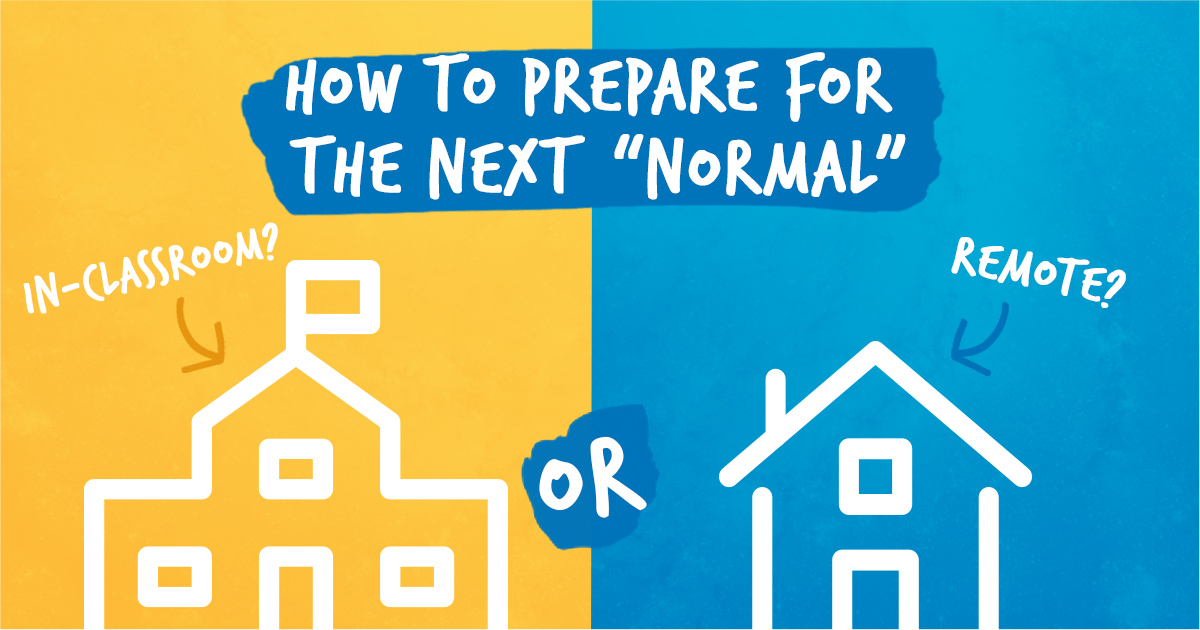Tips for Teaching Remotely or in the Classroom This Fall
5 Min Read | Sep 7, 2021

If 2020 has taught us anything, it’s to expect the unexpected. There may be a lot of unknowns these days: Will another roll of toilet paper ever grace the shelves of our local grocery store? Will we ever get back all the social skills we lost while we were quarantined? One thing we do know is that education can and will continue—one way or another! And we want to shout out teachers everywhere for how you handled the curve balls of last semester with grace and grit.
This fall, whether your school has made the call to go 100% remote, 100% in-person, or some combination of the two, here are some tips—straight from your fellow teachers—for teaching while adjusting to whatever the next “normal” may be.
1. Set expectations right away.
Students will probably have a whole range of emotions when they get back to school. If you’re having class in person, they may be hyper and excited, frustrated by whatever health precautions your school is taking, scared of getting sick, or any combination of the above. Students in hybrid classes that alternate different groups of students on certain days may feel angry or sad that they don’t get to be with their friends. And if you’re having online-only classes, students may feel depressed and discouraged that they all have to go through pretty much the same thing they did last semester.
Are you a teacher? Help your students win with money today!
Be prepared for the wave of emotions by establishing your own emotions, tone, and class rules from the very first day of classes (and stick to them!). Put your expectations in your syllabus, but try to overcommunicate by having an honest conversation with your students too. There’s a saying we love around here that says to be unclear is to be unkind, so do them the favor of being crystal clear with them up front about what the rules are going to be this semester.
And when it comes to talking about COVID, there’s no need to pretend it never happened—talk about it up front in order to establish expectations, but then try not to keep bringing it up if possible. Your students might want to consistently make it a topic of conversation, but unless it directly applies to the lesson at hand, remind them that they’re all here to learn and that there’s life beyond coronavirus.
If your school has counselors, remind your students that talking their fears over with someone can be really helpful—or you could offer extra help during office hours for students who are struggling, if that’s something you’re willing to do. But making an effort to not focus on the pandemic during the regular class period will help things feel more normal for your students. Plus, the calmer you are about the whole situation, the calmer your students will be (hopefully).
2. Get to know your students.
You guys are already pros at this, but especially right now, taking the time to really get to know your students individually will help them feel more at ease and confident in school when everything else feels crazy. Even if they’re in high school and think they’re too cool for this stuff, playing some icebreaker games with them can lighten the mood and help them bond with their classmates. We put together a list of fun icebreaker activities (some for in the classroom, some that can be done virtually) that you can whip out at the start of class!
If icebreakers aren’t your jam, you might want to think about simply taking a few minutes during each class period at the start of the semester to ask students some questions about themselves. Ask them about their interests, hobbies, what they did over the summer, what they hope to get out of the class—whatever you genuinely want to know about. And tell them about yourself too! You might not think your students want to know details of your personal life, like getting a new puppy or the awesome restaurant you just found, but a lot of them actually do. Any opportunity you get to connect with them, take it. Chances are, they’ve been needing human connection more than ever lately.
3. Be prepared for questions from parents.
Remember when we brought up overcommunication? Parents are bound to have plenty of concerns, fears and questions about the upcoming semester, and you can never really communicate too much in situations like this. Whatever expectations and guidelines you’ve given your students are worth sending out to the parents as well so everyone can be on the same page.
Talk to your administrators about how you want to communicate with parents right now, and let your administrators know how you’d like them to field questions on your behalf if any issues come up that you can’t address right away. Mentally prepare yourself in advance for questions and comments you might get from parents and how you’re planning to answer them—and when in doubt, take a deep breath and try to stay as calm as possible. This is a stressful and uncertain time for everyone, but just like your students, parents will be less worried if you’re less worried.
One final way you can help ease students’ and parents’ fears about the future is by incorporating personal finance education into your class discussions. If you want to help equip students to be smart with money and handle whatever comes their way, check out our Foundations in Personal Finance curriculum. It’s available in a fully digital format that’s perfect for remote, classroom or hybrid learning. Whatever you’re facing this fall, we’ve got your back and we’re wishing you a safe and sane semester. Thank you for being superheroes for your students. We’re cheering you on (from six feet away)!


